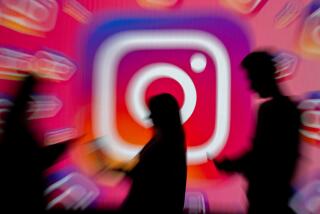Will Cachet of Online Magazines Wear Off for Readers?
- Share via
SAN FRANCISCO — The first issue of Salon offers a thoughtful interview with author Amy Tan, a harangue by essayist Camille Paglia and a round-table discussion about race in America by seven prominent thinkers and activists.
But don’t look for Salon on your local newsstand. You’ll find it, instead, at https://salon1999.com.
Salon is the latest but far from the last effort to create virtual magazines on the Internet--magazines without paper, without postal muss and fuss, without limitations of length.
Just ideas, images--and, of course, ads.
While the rush has been on to provide “content” for online services--text, pictures and sound that will bring people back to World Wide Web sites (and their ads) again and again--some thoughtful folks say what is really needed is good content.
And to provide it, they’re launching online magazines with paid writers, graphic designers and big-name editors.
In a move that lent a certain degree of cachet to these ventures, the Microsoft Network last month hired Michael Kinsley, former editor of the New Republic and co-host of CNN’s “Crossfire,” to launch an online magazine of commentary on news, politics and culture.
Kinsley, who will start work on the new venture after the first of the year, is cautious about the possibilities offered by the new medium.
“I’m hoping that [online] can have more impact because of the immediacy, but that certainly remains to be seen,” he said by phone from his Washington office.
When the announcement was made, some on the Internet questioned whether a print person who admitted to being unversed in the online world could create a viable Net publication. But Gary Wolf, executive editor of HotWired, one of the oldest such publications on the Net, sees it as legitimizing the idea of online magazines.
“It’s not like [Microsoft] needs to hire Michael Kinsley to advise them on technical matters. A rising tide lifts all boats--maybe this will usher in a new day for all of us.”
HotWired is a stepchild of the print-based Wired magazine and has 289,000 registered readers--but to a certain extent Wolf feels they’re preaching to the converted.
“We have a certain audience--the leaders of digital culture. They already know this stuff is legitimate.”
Maybe, Wolf said, Kinsley and the behemoth that is Microsoft Corp. can convince the rest of the world.
The editorial team at Salon, which went up on the World Wide Web last month, is going after an audience that listens to National Public Radio and reads Harper’s Magazine.
“We want an intelligent talk magazine,” said editor and co-founder David Talbot, formerly arts and features editor at the San Francisco Examiner. “We want to bring in prominent writers that we’ve worked with; we want provocative, powerful writing.”
But however exciting the words, however beautiful the layout, can any online magazine overcome “the bathroom factor?”
“You can’t take a computer to bed very comfortably. You can’t read it from the tub. There will still be some limitations,” said Russell Siegelman, vice president of the Microsoft Network and the one who hired Michael Kinsley.
“We’ll definitely have a print button,” said Siegelman.
In fact, leaving printing to the readers can be an opportunity rather than a liability.
“Writers are usually the afterthought in most publications. You get around to paying them after you’ve paid the printing bill,” Salon’s Talbot said.
“We don’t have printing bills here, so for the first time we are able to put the money where the talent is.”
Still, magazines and newspapers have existed for several hundred years in their current format because they provide interesting writing that’s portable. The Web is most certainly not that, which begs the question: Will people really went their magazines online after the novelty has worn off?
Not if they’re merely being offered an on-screen version of something they might just as easily find in print, said Donna Hoffman, a professor at Vanderbilt University who studies marketing and commerce on the Internet.
“The thinking now is that there has to be a way for people to interact--you have to give them a reason to log on, read the stuff and then come back again and again,” she said.
What these new online publishing ventures say they plan on offering their readers is not just quality journalism, but something for which there seems to be a deep hunger in America today--community.
Salon, for example, features a Table Talk section where readers can talk to the writers and each other about the articles and everything else.
Magazine are great, but they’re basically a solitary pursuit, said Salon’s publisher, David Zweig. Salon hopes to offer a community of like-minded souls to debate the issues of the day with.
“We can turn the magazine into a living entity of people who care for each other. We want to be a spirited, fascinating dinner party with a great clash of views and a lot of civility.”
Mass media, Zweig believes, has lost the concept of civility, and we’ve all lost the art of conversation. The computer screen, according to those betting on online publishing, may be the way to bring it back.
More to Read
Sign up for Essential California
The most important California stories and recommendations in your inbox every morning.
You may occasionally receive promotional content from the Los Angeles Times.













